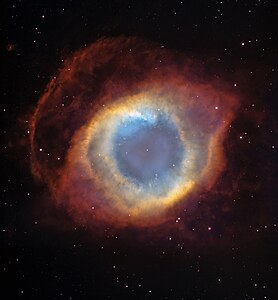Pantheism
Pantheism is a world view and philosophical doctrine according to which the universe, nature, and the deity that monotheists call God are equivalent. Pantheism does not stipulate an entity such as God Rather, natural law, existence, and the universe (the sum of all that was, is, and will be) is represented by the theological concept of what religions call "God." In addition, it is an evident variation of monism, since the only truth, cause, primary substance or matter that constitutes the world, according to pantheism, is God. Likewise, Pantheism would give rise to the later concept of panentheism, in which God encompasses the universe and its laws, but which goes further and is not limited to an equivalence between God and the universe.
Etymologically, the word is composed of the Greek term πᾶν (bread), 'everything', and θεός (theos), 'God'. In general, pantheism can be considered as a philosophical ideology or as a conception of the world. In theism two terms are confronted: "god" and "world". Pantheism proceeds to relate them to the fullest; the result must be a monism, which can take various characterizations discussed below.
Some examples in history have been the Hindu (Brahman), Taoist (Tao) and Buddhist (Buddha) religions. As you can see, it has been part of the historical construction of Eastern cultures. In addition, in ancient Greece, Stoicism (Logos) and Neoplatonism (Unity from which all beings come, described by Plato and Aristotle) also had certain ideas that can be related to this thought. In different philosophies such as the medieval Christian (God conceived by Nicholas of Cusa), the Muslim (Allah, according to Averroes and Alfarabi) and the Jewish (God conceived by Acicebrón) they have also had a tendency. And finally, modern philosophies such as German idealism (The absolute self) and Hegel's (Idea together with the dynamism of nature and the evolution of human history) have not been spared from the influence of pantheism. By way of clarification, medieval Christian, Jewish and Muslim philosophy had an elementary contribution to Neoplatonism.
Pantheism became popular in Western culture as a theology and philosophy based on the work of the 17th-century philosopher Baruch Spinoza, in particular his book Ethics. Also taking a pantheistic stance in the 16th century was the philosopher and cosmologist Giordano Bruno.
Etymology
Pantheism derives from the Greek word πᾶν pan (meaning "all, of all") and θεός theos (meaning "god, divine"). The first known combination of these roots appears in Latin, in Joseph Raphson's 1697 book De Spatio Reali seu Ente Infinito, where he refers to "pantheism" of Spinoza and others. It was later translated into English as "pantheism" in 1702.
Definitions
There are numerous definitions of pantheism. Some consider it a theological and philosophical position regarding God.
Doctrine that identifies God with the universe, or that considers the universe as a manifestation of God.
Pantheism is the view that everything is part of an immanent, all-encompassing God. All forms of reality can be considered modes of or identical to that Being. Some hold that pantheism is a non-religious philosophical position. For them, pantheism is the view that the Universe (in the sense of the totality of all existence) and God are identical.
Origin
The origin of pantheism is attributed to Hindu and Greek philosophy, it is claimed that their religious texts are the oldest with this kind of ideas. In Indian Philosophy, more specifically in Vedanta, Brahman is the superior reality in the universe (considering however that the concept of it even encompasses beyond the Universe and what is related to it). This reality is considered as the infinite, impersonal, omnipresent, omnipotent, abstract, immanent and transcendent truth in the universe. Although Brahman is the only foundation of the universe, in turn, it is the sum total of what was, is and will be in the universe.
Subsequently, in the Balkans a similar thought would also be developing, in which thinkers such as Thales, Heraclitus and Parmenides who, together with their followers, raised notions of pantheism and the divine nature of matter, but never explicitly spoke of a "pantheism". It can be affirmed that the specific origin of pantheism is unknown, since it has been an evolution of very old ideas and from different places, but the term "pantheism" it is attributed to the mathematician Joseph Raphson in his work De Spatio Reali seu Ente Infinito written in 1697. That said, throughout history, people, such as the Irishman, John Toland, have made reference to this subject and it has diversified so much that different variations of the philosophical current have been created.
Classes
Very generally pantheism can be divided into two thoughts. Transcendent pantheism, which believes that God is beyond the limits of the universe (superiority) and is present everywhere. On the other hand, there is immanent pantheism, which conceives of God as the universe itself, so that by identifying it as the cosmos, it in turn identifies itself as inherent in nature. It is necessary to clarify that, although it sounds like a contradiction, immanent transcendent pantheism exists and is reflected in Brahman, the Hindu god explained above.
According to the training, three types of pantheism have been created: pre-theological, theological and post-ological. The first was formed in those cultures where the concept of sacredness and the unity of the world had not been established. The second is the result of the amalgamation of polytheistic cultures. The third is the synthesis of the different religious instances, so pantheism can be conceived as a modern pantheism, since it has emerged.
According to the conception of the god, pantheism can be divided into the acosmist, who conceives his god as the ultimate reality of the world and all-encompassing of all that exists. The realist-naturalist or atheist describes God as a unit of the entire universe, since he is seen as the derivation of the unification of all natural phenomena understood by science. And, the idealist sees god, the One-All, as a spirit or absolute idea of the universe.
Heraclitus
Pantheism is a doctrine or an identifiable component in the ideas of the Greek philosopher Heraclitus, in the fragments of him that are preserved. According to the Pre-Socratic philosopher of becoming, the divine is present in the totality of things and, at the same time, is identical to the world and to beings in their entirety. This conception drags us to compare the divine with the Universe, transforming it into the "generating fire" that unifies all opposites.
That god-all of Heraclitus congregates in himself the totality of things and is, in the same way, a reality of an eternal nature. His cosmology also seems to refer to the theory of a world of cyclical movement, by virtue of which the whole resembles a set of alternate phases: a kind of destructive and productive cycle, which later has to be resumed and developed. by the stoics.
Plotinus
Plotinus' pantheism has been talked about frequently -and perhaps inappropriately-. Actually, for him divinity retains for itself the two characters, immanence and transcendence. The Plotinian god, penetrating all realities, is above all of them. Thus, the philosopher clearly maintains that the One, "as the principle of the whole, is not the whole". Such an affirmation seems to oppose the immanentist and pantheistic appreciations or interpretations of his thought.
Giordano Bruno
Giordano Bruno's worldview can well be understood as an "atheistic pantheism", with certain specific features of "pan-psychism". In his work De la causa, the beginning and the One is where his fundamental ideas about natural reality are found.
A general form or scheme of the universe is the so-called "soul of the world", whose preponderant faculty is a complete and universal intellect, which fills everything and illuminates everything.
Matter constitutes the second principle of nature, by which all things are formed. The aspects of entities can change, vary or diverge, but it is always the same matter that sustains and endures under the external transformations.
Baruch by Spinoza
It has been usual in modern times to consider the philosophy of Baruch Spinoza as the most eminent and radical example of pantheism, thus constituting the model for all pantheisms that will follow it. This is mainly due to his statements about the monism of substance and the modal status of finite individuals, especially man: "Everything that is, is in God, and without God nothing can be or be conceived" (Ethics , I, XV). Spinozism, however, should be considered rather as panentheism, because for the Dutch philosopher everything is in God and the Supreme Being is not confused with the world or with the totality of its modes, Spinoza preserving the distinction of order scholastic between natura naturans (God as the principle of being and of his irreducible life to every particular living being) and natura naturata, a set of infinite and finite modes. Since God is constituted by an infinity of attributes of which we only know two (thought and extension), Spinoza's metaphysics cannot be interpreted either as a materialist pantheism or as a spiritualist pantheism, since it is said to be both res extensa and res extensa. res cogitans. Spinoza's pantheism has been the subject of much criticism; one of the most prominent is that of Schelling, who considers that Spinoza "annuls the freedom and personality of God by reducing him to a mere object incapable of relating to the world".
Other possible pantheistic thinkers
The truth is that pantheists have emerged in the history of philosophical and theological thought, perhaps because of the metaphysical appeal that the divine exerts on man. Among the ancient thinkers with pantheistic traces, we can also mention the Jew Philo of Alexandria (25 BC- 50 AD), and Ammonius Sacas (175 AD-242 AD).
From a New Age perspective, many thinkers from various religions have been misidentified as pantheists in an effort to give validity or renown to their theories. In the Middle Ages, figures such as Scotus Eriugena (810-877), Bernardo de Tours (+ 1150) and, above all, Eckhart of Hochheim (1260-1327) saw the divine substance in the beings of the world, but this is not pantheism., since they are ideas that appear in the Catechism itself. The difference is that Christianity affirms that everything that exists, being created by God, has a certain substance or divine seed but is not God in itself, whereas pantheism affirms that everything is God, denying that God exists as a personal entity with own will, thus being a contrary idea. Notably so were the Enlightenment mystic Antonio Rosmini (1797-1855) and perhaps the Jesuit anthropologist Pierre Teilhard de Chardin (1881-1955) with their theocosmic perspectives of man and life.
Scientific Pantheists
- Esteban Montoya Marin
- Ludwig Boltzmann
- Albert Hofmann
- Diego José Tijerina Zaragoza
- Robinson Jeffers
- D. H. Lawrence
- Frank Lloyd Wright
- Michio Kaku
- Albert Einstein
Fiction
The anime series Earth Girl Arjuna (地球少女アルジュナ Chikyū Shōjo Arjuna) takes place under a pantheistic vision, and whose main theme is the connection that exists between all the elements that make up the Earth.
The film Avatar takes place in an environment whose inhabitants have a totally pantheistic vision.
In the Star Wars saga "the Force" It is conceived as that energy that lives in all beings in the universe and keeps them connected.
Contenido relacionado
Linji
Zion
Deism





